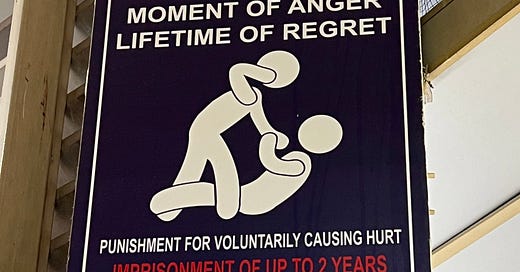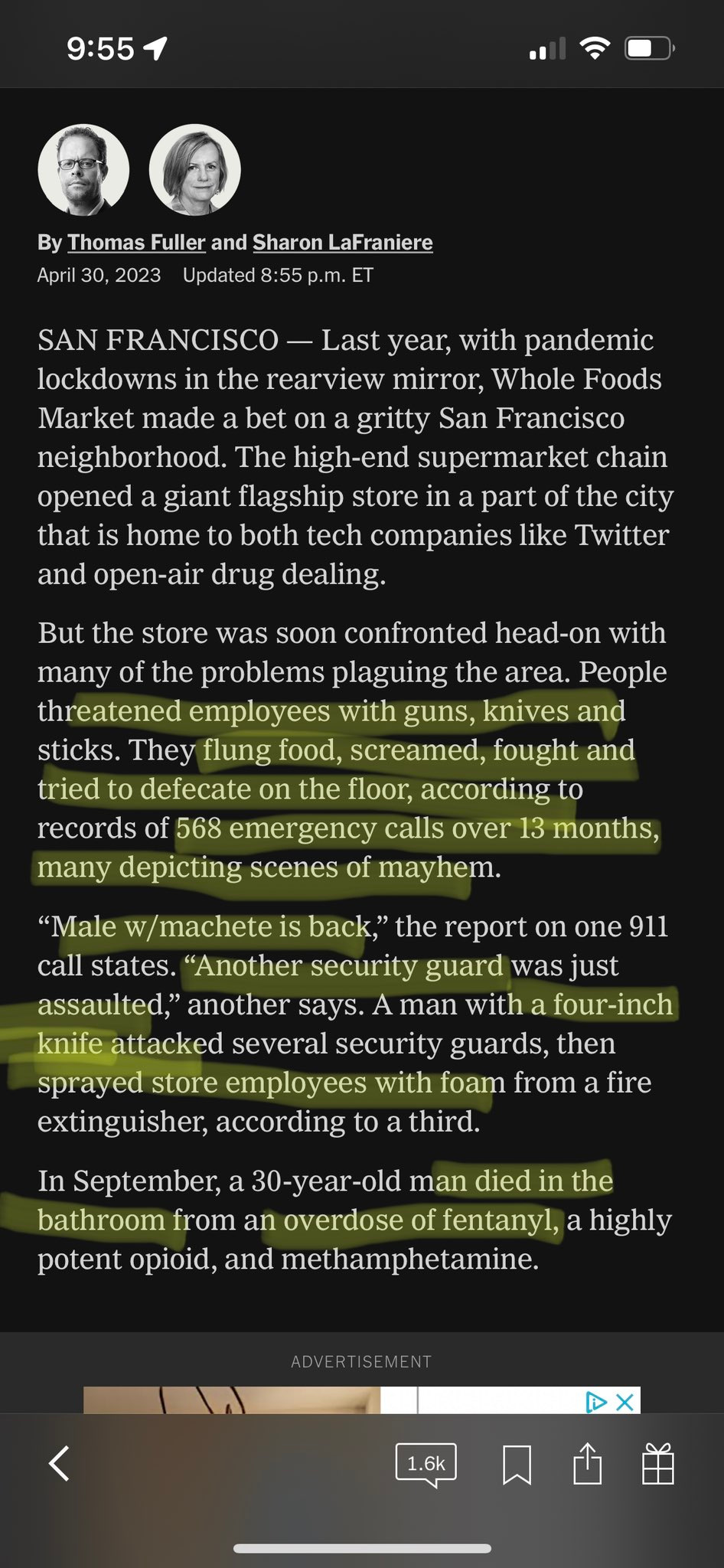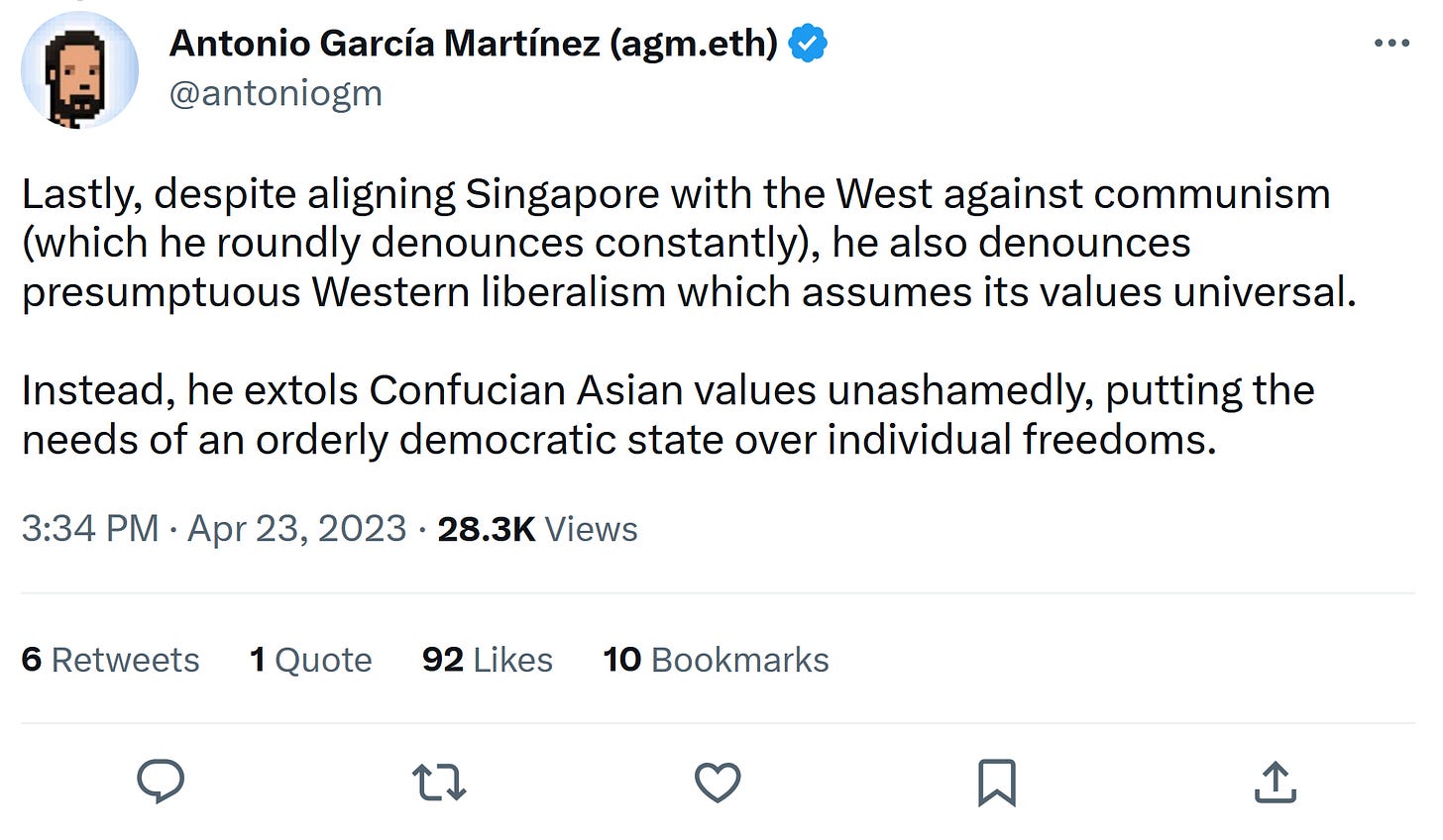This Is Why We Can't Have Nice Things
Unyielding enforcement of customs, laws, and social norms leads to peace, order, and safety, not the other way around.

I personally don’t hear it as much anymore, but once upon a time, a common refrain among certain Americans - cosmopolitan, left-leaning, well-credentialed - was that the United States is backwards relative to much of the developed world. Most such accusations surrounded our comparative lack of social services, like free university education and universal healthcare, but it also pertained to quality of life, especially when it came to crime.
I’ve said it before and I’ll say it again - America isn’t a peaceful place. But just how violent is it? Not as much as it seems, though numbers can be deceiving, especially when talking about a country of over 300 million people. The U.S. is, thankfully, a far cry from equally-sized countries like Brazil. Depending on where in the country you live, however, your risk of being victimized by crime can go up and down dramatically. Both our geographic and population sizes are reasons for exercising caution when attempting to compare the U.S. with the rest of the developed world. America truly is exceptional and in a class all its own.
Why am I saying this? It all came to mind when reading this article from The New York Times:
Singapore on Wednesday executed a man convicted of conspiring to traffic about two pounds of cannabis, a punishment that human rights groups called grossly excessive with other countries around the world relaxing their stances on marijuana.
The man, Tangaraju Suppiah, a 46-year-old Singaporean, was sentenced in 2018 for coordinating with two other men to import the cannabis in 2013. Although he never came into contact with the drug, he was sentenced to death by hanging after a judge ruled that he was linked to the other men through two phone numbers belonging to him.
Singapore’s narcotics laws are some of the harshest in the world and mandate the death penalty for some drug trafficking offenses. Last year, the country executed 11 people, all for nonviolent drug offenses.
Singapore has continued to use executions for drug-related crimes even though its neighbor and rival, Malaysia, recently ended its mandatory death penalty for serious crimes, including drug offenses.
As an American, I personally find the punishment to be disproportionate to the crime. In my view, the death penalty ought to be reserved for especially heinous crimes like murder, rape, or even drug dealers who traffic “harder” drugs like cocaine and fentanyl. For a “softer” drug like marijuana, I don’t know. Death seems a bit much.
However, Singapore didn’t become such a nice place to live because it thought the best way to deal with crime was through leaving people to their own devices, while catching them when they fell (progressivism). Under the leadership of Lee Kuan Yew, Singapore realized even good people do bad things and, to maintain order and establish civil society, you needed barriers and rules in place and they needed to be strictly enforced. Maybe an argument can be made that Singapore is too strict - I certainly don’t want to live in a place where you can’t chew gum - but there’s no pretending otherwise: unyielding enforcement of customs, laws, and social norms leads to peace, order, and safety, not the other way around.
Yet, in the West, we’ve somehow deluded ourselves into thinking that enforcing the law too much leads to more crime and safety. There’s a certain logic to this - if you criminalize everything, then everything’s a crime. But we’re not talking about the government engaging in frivolousness, selectively going after low-hanging fruit, while ignoring problems that impact our safety and quality of life. This is called anarcho-tyranny, a running theme of this blog.
Rather, we’re talking about the government enforcing the laws that make a safe and orderly society possible. This means arresting violent criminals and putting them away - or down - for good. This means dealing with dangerous drivers. This means not tolerating public nuisances. This means insisting that all people, citizens or otherwise, adhere to a standard of conduct in public spaces and this standard is upheld with violence, if needed. How else would you do it?
Look at these signs to see the extent to which Singapore takes seriously its duty to maintain law and order:
I’ve said before in these spaces: it takes less energy to restrain yourself than it does to lash out violently. Not only that, there’s often a steep price to pay after the fact. Never operate under the assumption that the use of violence is cost-free. It’s not a matter of whether you get away with it or not, it’s a matter of if the wrong person catches you in the act or not. It’s nice to see a country take the time and effort to advise everyone to exercise restraint instead of spouting meaningless platitudes about how “violence doesn’t solve problems.” That’s not the point. Nor do most people use violence as a means of solving problems, they use it as a means of feeding their egos and satisfying emotional needs.
Here’s another PSA from Singapore:
In the U.S., you can also go to jail for “outrages of modesty,” though it’s certainly not as sure of a thing as in Singapore. But the corporal punishment (caning) is what stands out here. I can’t help but think we’d have less crime in the U.S. if the threat of physical punishment were as bluntly communicated as it is in Singapore. Most people, criminals included, not only fear physical punishment, but they also fear the humiliation that comes with it, even more so.
There’s no greater affront to someone (again, criminals included) than to be violated by others. That’s the whole purpose of punishment: if you violate the rights of others or fail to check your own behavior, you will be violated as a consequence and your behavior will be checked on your behalf. It’s the same reason why corporal punishment has been used to discipline children for eons - if children don’t enjoy pain and humiliation, why would adults? In my view, there’s a far greater argument to be made for adults being caned than children, since the whole idea of being an adult is to be accountable for oneself. If asking nicely doesn’t get the job done, then what will?
I know some readers might have a problem with what I just said, but I stand by it. Having seen how the worst of us can be, I can tell you people don’t change easily. Certainly, reasonable people change more easily and maybe they’ll be deterred by threats of severe punishment, but reasonable people don’t become criminals and delinquents, either. Those who commit crimes and choose to participate in society according to their own dictates, they’re the ones who need the additional incentive. If they can’t be deterred, then there’s no choice but to “sacrifice” them, so to speak, and send the message to the would-be criminals: choose wisely. It’s a system that works because it deters those who can be deterred and it excises from society those who cannot. If the state cannot fulfill this simple obligation, who can? Why should the state exist?
A few weeks ago, Michelle Tandler, one of my favorite Twitter accounts, came under heavy fire for the following tweets:
I recommend reading the entire thread. Tandler’s a San Francisco native and has been outspoken about her home city’s collapse. A lot of respondents took what she said to be an endorsement of vigilante justice and lynching, ironically calling for her own death for thinking bad thoughts. Interesting. More ironically, these are precisely those people I was referring to at the outset of this piece - the people who consider America backwards compared to places like Singapore. Yet when it comes down to a serious conversation about what it takes to have nice things, they have no shortage of excuses for why we shouldn’t have more police, we shouldn’t jail criminals, and why drugs should all be legalized.
Tandler had to clarify she was against the death penalty and was merely engaging in a thought experiment. Since enabling drug dealers/users and leaving people to their own devices has so obviously and spectacularly backfired, she was positing that it often takes harsh actions to restore order and establish rule of law. This is fact. There’s a reason why societies often start off being oppressive and overbearing, gradually loosening its grip and liberalizing over the course of its history. Order and rule of law aren’t things established overnight - they take time and, unfortunately, it costs blood. If you want to know what our home and native land was like in its early days, read this great thread authored by my friend and scholar, Nicole Williams:
https://twitter.com/nicolew100/status/1646314880641687560
Well duh, that’s what governments are for! I’m sure a lot of people would say that in response. And that’s the damn point! If the government isn’t going to do a thing, as in San Francisco and increasingly across the country, who will? Better yet, who should? Anyone who suffers a moral panic at the thought of Michelle Tandler’s vigilantes going around and hanging drug dealers, Nicole Williams’ early American militias exacting frontier justice, of all people should have no issues with Singapore caning rioters and illegal immigrants. Either the state, which extorts our money and attempts to control our lives can maintain order, or we the people will. There’s no in-between. And order must be maintained, for there’s no society without it.
The same way Tandler wasn’t calling for vigilante justice, I’m not calling for America to become like Singapore. Even if I wanted it, I don’t know if it’s physically possible in a country the size of continental Europe with over 300 million people. By comparison, Singapore has roughly two million more people than Los Angeles, but roughly three million less than New York, and it could be easily fit into Rhode Island, our smallest state. More important, I think even it’s haters love the U.S. precisely because it’s not like Singapore: here, we’re allowed to make mistakes and have second chances. People are fallible and I’d rather live in a society that recognizes our imperfections as humans than one that insists on zero defects. There’s a high personal cost to pay for that, too.
But there’s a world of difference between allowing people to make mistakes and openly tolerating anti-social, degenerative behavior. The recent closure of a Whole Foods market in a nice part of town in San Francisco attracted a lot of commentary from talking heads about how the company was making a big deal about nothing, but I don’t know. Would you put up with this as a customer, employee, or business owner?
Unfortunately, as I alluded to in my last post, so many people have found themselves in a place where they cannot condemn even the acts described above, because to do so would be to commit the worst transgression of all - give the political opposition credence. Leftists the world over are willing to subject their societies to all sorts of chaos, degeneracy, and disorder in the name of becoming a kinder, gentler, society, but the exact opposite is happening. How can someone consider America backwards relative to places like Singapore while failing to see that Singapore is what it is because it doesn’t tolerate what we tolerate here?
One more note about the Asian city-state:
Among the toughest of pills for any Westerner to swallow: people prefer an orderly, predictable existence over a chaotic, unpredictable one. Individual freedoms are what makes life in America so great, but it comes with trade-offs. One of those trade-offs is a less orderly, if not disorderly, and less predictable society. Even free societies need order, however. How else do you guarantee the rights of others to live without violation? If you want nice things, you need to pay a price for it.
What do you think? Would you prefer to live in a Singapore-like society? Is it too much or does Singapore have the right idea about what it takes to establish and maintain civil society? Share your thoughts in the comments below.
UPDATE: Do you think you’d see something like this in Singapore? Why or why not (WARNING: graphic content)?
https://twitter.com/ppv_tahoe/status/1653044073010167810
For further context and another angle:
https://twitter.com/activeasian/status/1653120088156041216
Can any academic, journalist, or leftist politician out there explain to me how this is the product of too much law and order? Again, how do they think places like Singapore became so safe? Do they really believe it’s because their authorities let people do whatever they want in public, trusting in the supposed inherent goodness within all of us? Or is it because they understand people are flawed creatures who respond to incentives and that even an honor system requires some kind of insurance policy for it to work?
The fact is, most of us aren’t cut out for a place like Singapore. That’s not a bad thing. The problem is, there are too many of us not cut out for America. People who abuse their freedom and rights, like the savages seen in the videos posted just above, should be forced to pay a steep price. But what are the authorities doing? Nobody should worry about Michelle Tandler’s mention of vigilantes when there’s dangerous, illegal street sideshows going on today putting lives at risk right here, right now.
Those who have trouble behaving themselves in a place as accommodating and permissive as the U.S. ought to instead consider life in an active war zone.
Max Remington writes about armed conflict and prepping. Follow him on Twitter at @AgentMax90.
If you liked this post from We're Not At the End, But You Can See It From Here, why not share? If you’re a first-time visitor, please consider subscribing!








I used to assume that leftists were subjecting their societies to chaos, degeneracy, and disorder to help us become a kinder, gentler, society. I now realize the exact opposite is true. They are intentionally breaking down society to rebuild an Orwellian dystopia that benefits the wealthiest people on the planet at the expense of human identity and even civilization itself. Mere stupidity or even depravity are insufficient explanations for the intentional chaos the left inflicts. The irony is that we will wind up living in a soulless society ruled far more ruthlessly than Singapore by people who want us to eat bugs, own nothing, and like it.